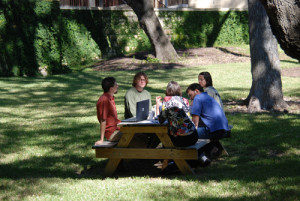What is an argument? “Argument is an intellectual process,” says a frustrated client at the Argument Clinic in a Monty Python sketch. “Contradiction is just the automatic gainsaying of any statement the other person makes.”
“No it isn’t,”is John Cleese’s inevitable reply.
 Among the Episcopalians gathered in Salt Lake City this summer, there will likely be a good bit of both argument and contradiction. In fact, argument, that “intellectual process”that seeks to persuade by connecting grounds to conclusions by way of strong warrants, is an essential theological task that often gets swept aside because we associate it too quickly with contradiction, contentiousness, or any of the other ugly directions that disagreement sometimes takes. Arguments seem inhospitable. Sometimes a necessary evil, but never an act of hospitality.
Among the Episcopalians gathered in Salt Lake City this summer, there will likely be a good bit of both argument and contradiction. In fact, argument, that “intellectual process”that seeks to persuade by connecting grounds to conclusions by way of strong warrants, is an essential theological task that often gets swept aside because we associate it too quickly with contradiction, contentiousness, or any of the other ugly directions that disagreement sometimes takes. Arguments seem inhospitable. Sometimes a necessary evil, but never an act of hospitality.
I believe this is the wrong way for Christians to feel about arguments. Arguing is theologically important because when we affirm our faith in the Word made flesh, we are reminding one another that the eternal truth became humanly followable in Christ. Not that we can fully comprehend it, of course. But we can follow it, as the disciples followed Jesus, opening their eyes and ears to the life and love that he revealed to them. Jesus is something like God’s argument, presented publicly so that we can gather round, ask questions, make challenges, and ultimately say, “Yes, I can follow that.”
Likewise, when Christians gather to discern together what the shape and future of the church should be, they have a theological responsibility to be followable in their language. If someone tries to sway a group by use of threats, bullying, or peer-pressure, we should see this as a failure of Christian witness. He or she is acting on an impulse for sovereign control that is foreign to the God revealed in Christ.
Just as problematically, we can value conversation in a way that avoids argument. This in effect creates a cult of listening that refuses to move toward any shared conclusion. The exchange ends and everyone goes on thinking what she thought before. Or, worse, we descend into contradictions, grandstanding, and endless contention, and then those empowered to make decisions wind up doing so based on their own convictions rather than on critical and communal thinking.
Far from being an inhospitable response to difference, an invitation to follow an argument is a kind of linguistic hospitality: I respect you enough that I will place my conviction within a carefully crafted line of reasoning. Rather than try to manipulate you with verbal tricks or posturing, or let you speak your mind and then take the floor from you, I will invite you to challenge my premises, question the strength of the warrant I offer, and meet my reasoning with an argument of your own. This, again, is modeling the hospitable descent of the Logos in the incarnation.
Creating well-formed arguments, and following them, is hard work. Much harder than either nodding passively or rushing to “an automatic gainsaying of any statement the other person makes.” But, then, no one ever said hospitality of any sort was an easy task.
What is an example of linguistic hospitality that you have heard in the past 24 hours?
Anthony Baker joined the seminary faculty in 2004. He teaches classes in both historical theology (focusing on a figure, an era, or a school of thought) and constructive theology (the building of persuasive arguments about God and creation). He is the author of Diagonal Advance: Perfection in Christian Theology, as well as various articles in Modern Theology, Political Theology, The Journal of Anglican Studies, Anglican Theological Review, and other journals and collections.

